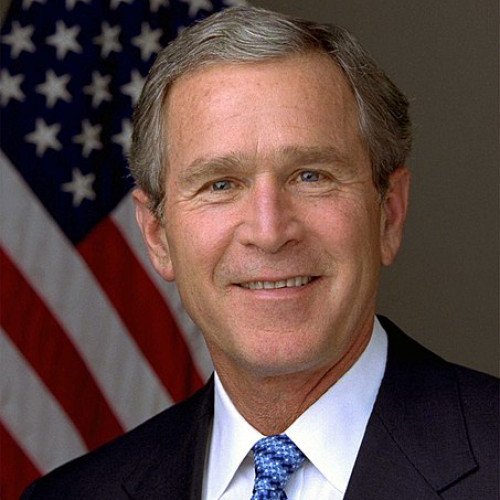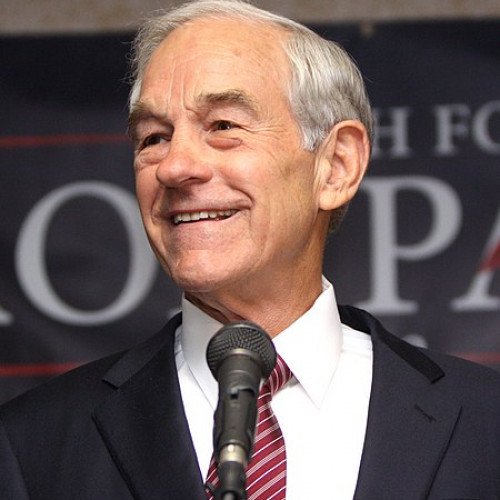George W. Bush VS Ron Paul

George W. Bush
George Walker Bush (born July 6, 1946) is an American politician and businessman who served as the 43rd president of the United States from 2001 to 2009. A member of the Republican Party, he had previously served as the 46th governor of Texas from 1995 to 2000. Born into the Bush family, his father, George H. W. Bush, served as the 41st president of the United States from 1989 to 1993. Bush is the eldest son of Barbara and George H. W. Bush. As such he is the second son of a former United States president to himself become the American president, with the first being John Quincy Adams, the son of John Adams. He flew warplanes in the Texas and Alabama Air National Guard. After graduating from Yale College in 1968 and Harvard Business School in 1975, he worked in the oil industry. Bush married Laura Welch in 1977 and unsuccessfully ran for the U.S. House of Representatives shortly thereafter. He later co-owned the Texas Rangers baseball team before defeating incumbent Ann Richards in the 1994 Texas gubernatorial election. As governor, Bush successfully sponsored legislation for tort reform, increased education funding, set higher standards for schools, and reformed the criminal justice system. Bush also helped make Texas the leading producer of wind powered electricity in the U.S. Bush was elected president in 2000 when he defeated Democratic incumbent Vice President Al Gore after a narrow and contested win that involved a Supreme Court decision to stop a recount in Florida. He became the fourth person to be elected president without a popular vote victory. Upon taking office, Bush pushed through a $1.3 trillion tax cut program and the No Child Left Behind Act, a major education reform bill. He also pushed for socially conservative efforts, such as the Partial-Birth Abortion Ban Act and faith-based welfare initiatives. In response to the September 11 terrorist attacks, Bush created the Department of Homeland Security and launched a "War on Terror" that began with the war in Afghanistan in 2001. He also signed into law the controversial Patriot Act in order to authorize surveillance of suspected terrorists. In 2003, Bush ordered an invasion of Iraq, beginning the Iraq War, with the administration arguing that the Saddam Hussein regime possessed an active weapons of mass destruction (WMD) program, and that the Iraqi government posed a threat to the U.S. Some administration officials falsely claimed that Hussein had an operational relationship with Al-Qaeda, the perpetrators of the 9/11 attack. No stockpiles of WMDs or an active WMD program were ever found in Iraq. Bush also signed into law the Medicare Modernization Act, which created Medicare Part D, and funding for the AIDS relief program known as PEPFAR. Bush was re-elected to a second term in the 2004 presidential election, defeating Democratic Senator John Kerry in a close race. During his second term, Bush reached multiple free trade agreements and successfully nominated John Roberts and Samuel Alito to the Supreme Court. He sought major changes to Social Security and immigration laws, but both efforts failed. The wars in Afghanistan and Iraq continued, and in 2007 he launched a surge of troops in Iraq. Bush received criticism from across the political spectrum for his handling of Hurricane Katrina, and the midterm dismissal of U.S. attorneys. Amid this criticism, the Democratic Party regained control of Congress in the 2006 elections. In December 2007, the U.S. entered the Great Recession, prompting the Bush administration to obtain congressional approval for multiple economic programs intended to preserve the country's financial system, including the Troubled Asset Relief Program (TARP) to buy toxic assets from financial institutions. Bush was among the most popular, as well as unpopular, U.S. presidents in history; he received the highest recorded approval ratings in the wake of the 9/11 attacks, but one of the lowest such ratings during the 2008 financial crisis. Bush finished his second term in office in 2009 and returned to Texas. In 2010, he published his memoir, Decision Points. His presidential library opened in 2013. His presidency has been rated as below-average in historical rankings of U.S. presidents, although his public favorability ratings have improved since leaving office.
Statistics for this Xoptio

Ron Paul
Ronald Ernest Paul (born August 20, 1935) is an American author, physician, and retired politician who served as the U.S. Representative for Texas's 22nd congressional district from 1976 to 1977 and again from 1979 to 1985, and for Texas's 14th congressional district from 1997 to 2013. On three occasions, he sought the presidency of the United States: as the Libertarian Party nominee in 1988 and as a candidate in the Republican primaries of 2008 and 2012. A self-described constitutionalist, Paul is a critic of the federal government's fiscal policies, especially the existence of the Federal Reserve and the tax policy, as well as the military–industrial complex, the war on drugs, and the war on terror. He has also been a vocal critic of mass surveillance policies such as the USA PATRIOT Act and the NSA surveillance programs. He was the first chairman of the conservative PAC Citizens for a Sound Economy, a free-market group focused on limited government, and has been characterized as the "intellectual godfather" of the Tea Party movement, a fiscally conservative political movement that is largely against most matters of interventionism.Paul served as a flight surgeon in the U.S. Air Force from 1963 to 1968, and worked as an obstetrician-gynecologist from the 1960s to the 1980s. He became the first Representative in history to serve concurrently with a child in Congress when his son, Rand Paul, was elected to the U.S. Senate from Kentucky in 2010. Paul is a Senior Fellow of the Mises Institute, and has published a number of books and promoted the ideas of economists of the Austrian School such as Murray Rothbard, Friedrich Hayek, and Ludwig von Mises during his political campaigns. After the popularity of his 2008 presidential bid, Paul announced in July 2011 that he would forgo seeking another term in Congress in order to focus on his 2012 bid for the presidency. Finishing in the top four with delegates in both races (while winning four states in the 2012 primaries), he refused to endorse the Republican nominations of John McCain and Mitt Romney during their respective 2008 and 2012 campaigns, and on May 14, 2012, Paul announced that he would not be competing in any other presidential primaries but that he would still compete for delegates in states where the primary elections had already been held. At both the 2008 and 2012 Republican National Conventions, Paul received the second-highest amount of delegates behind only McCain and Romney respectively. In January 2013, Paul retired from Congress but still remains active on college campuses, giving speeches promoting his libertarian vision. He also continues to provide political commentary through The Ron Paul Liberty Report, a web show he co-hosts on YouTube. Paul received one electoral vote from a Texas faithless elector in the 2016 presidential election, making him the oldest person to receive an electoral vote, as well as the second registered Libertarian presidential candidate in history to receive an Electoral College vote, after John Hospers in 1972.